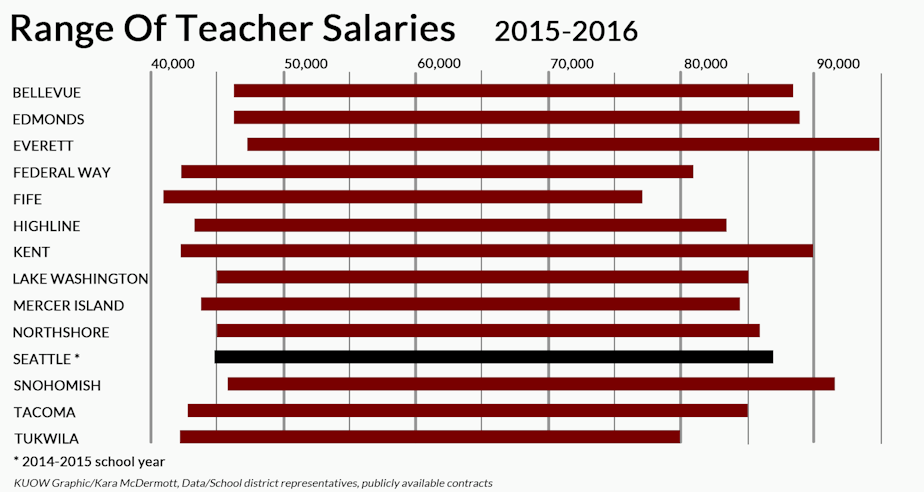What Teachers Earn In Seattle (And Why Other Districts Pay More)

Standing outside Roosevelt High School on Thursday, a Seattle teacher held up the gold standard.
It was the tentative contract for Everett schools, which promises veteran teachers with a master’s degree and the maximum education credits nearly $100,000 by 2017.
That’s the top of the salary range, but teachers could earn more by coaching or heading choir, for example. The top-earning teacher in Seattle last year got $121,240.
Most teachers don’t earn nearly this much, of course. New teachers in Seattle started at $44,372 last year, which could make it tough to live in this increasingly pricey city. Seattle teachers with eight years experience and a master's degree earned roughly $64,000.
“Commuting from Renton and Kent – they don’t want to be commuting an hour each way,” said Rich Wood, spokesman for the Washington Education Association. “So they quit Seattle and go work closer to where they live.”
Sponsored
Lake Washington School District is facing a similar issue, said spokeswoman Kathryn Reith. She said the district, which includes Kirkland, Redmond and half of Sammamish, has seen a bit of brain drain because traffic keeps getting worse and teachers prefer to work closer to home.
The problem for Lake Washington: Teachers might decide the gas money and traffic aren't worth a little extra pay and opt to work for a poorer but closer school district.
Combing through teacher contracts in the area, KUOW found that districts in the wealthiest areas don’t necessarily pay their teachers the most.
How much teachers earn doesn't just boil down to a district’s willingness to pay them more. Some districts, like Bellevue, are allowed to pull in more local taxes than neighboring districts. And other districts are allowed to start their teachers on a higher salary base.
And it does come down to the district. The state didn’t raise its base pay – stuck at $34,048 for a starting teacher – for six years. The state finally raised the base pay by 2 percent this summer.
Sponsored
So teachers bargain with their districts for raises and money on top of the base. They would be doing this even if the state did raise its base, Wood said, which means salaries have increased at a sluggish pace.
That extra money is usually called TRI pay, for time, responsibility and incentive. Some districts give teachers that extra money without strings attached. Others demand that teachers work or take classes during the summer to earn that extra amount. Unions call that “more pay for more work."

